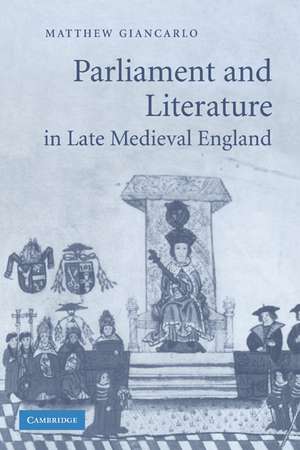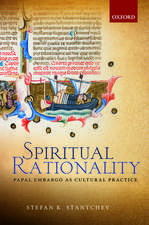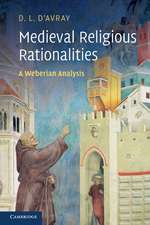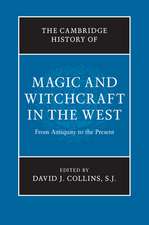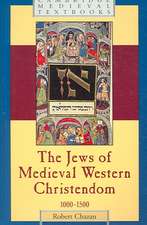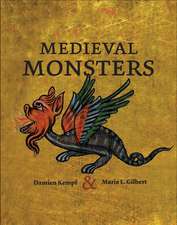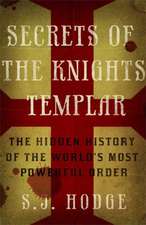Parliament and Literature in Late Medieval England: Cambridge Studies in Medieval Literature, cartea 64
Autor Matthew Giancarloen Limba Engleză Paperback – 23 iun 2010
| Toate formatele și edițiile | Preț | Express |
|---|---|---|
| Paperback (1) | 312.95 lei 43-57 zile | |
| Cambridge University Press – 23 iun 2010 | 312.95 lei 43-57 zile | |
| Hardback (1) | 697.62 lei 43-57 zile | |
| Cambridge University Press – 19 sep 2007 | 697.62 lei 43-57 zile |
Din seria Cambridge Studies in Medieval Literature
-
 Preț: 269.83 lei
Preț: 269.83 lei -
 Preț: 237.74 lei
Preț: 237.74 lei -
 Preț: 283.25 lei
Preț: 283.25 lei -
 Preț: 281.49 lei
Preț: 281.49 lei -
 Preț: 237.34 lei
Preț: 237.34 lei -
 Preț: 285.54 lei
Preț: 285.54 lei -
 Preț: 287.86 lei
Preț: 287.86 lei - 14%
 Preț: 695.69 lei
Preț: 695.69 lei - 8%
 Preț: 404.47 lei
Preț: 404.47 lei -
 Preț: 282.87 lei
Preț: 282.87 lei -
 Preț: 204.05 lei
Preț: 204.05 lei -
 Preț: 285.37 lei
Preț: 285.37 lei - 11%
 Preț: 587.15 lei
Preț: 587.15 lei -
 Preț: 207.35 lei
Preț: 207.35 lei - 11%
 Preț: 697.28 lei
Preț: 697.28 lei - 11%
 Preț: 639.78 lei
Preț: 639.78 lei -
 Preț: 177.58 lei
Preț: 177.58 lei - 11%
 Preț: 637.36 lei
Preț: 637.36 lei - 11%
 Preț: 637.89 lei
Preț: 637.89 lei -
 Preț: 496.50 lei
Preț: 496.50 lei -
 Preț: 324.62 lei
Preț: 324.62 lei -
 Preț: 282.48 lei
Preț: 282.48 lei -
 Preț: 284.17 lei
Preț: 284.17 lei -
 Preț: 206.57 lei
Preț: 206.57 lei -
 Preț: 337.25 lei
Preț: 337.25 lei -
 Preț: 196.25 lei
Preț: 196.25 lei -
 Preț: 306.68 lei
Preț: 306.68 lei -
 Preț: 230.23 lei
Preț: 230.23 lei -
 Preț: 209.44 lei
Preț: 209.44 lei - 11%
 Preț: 585.10 lei
Preț: 585.10 lei - 11%
 Preț: 583.02 lei
Preț: 583.02 lei -
 Preț: 306.21 lei
Preț: 306.21 lei - 11%
 Preț: 639.58 lei
Preț: 639.58 lei - 11%
 Preț: 642.35 lei
Preț: 642.35 lei
Preț: 312.95 lei
Nou
Puncte Express: 469
Preț estimativ în valută:
59.90€ • 65.09$ • 50.35£
59.90€ • 65.09$ • 50.35£
Carte tipărită la comandă
Livrare economică 21 aprilie-05 mai
Preluare comenzi: 021 569.72.76
Specificații
ISBN-13: 9780521147729
ISBN-10: 0521147727
Pagini: 308
Dimensiuni: 152 x 229 x 18 mm
Greutate: 0.45 kg
Editura: Cambridge University Press
Colecția Cambridge University Press
Seria Cambridge Studies in Medieval Literature
Locul publicării:Cambridge, United Kingdom
ISBN-10: 0521147727
Pagini: 308
Dimensiuni: 152 x 229 x 18 mm
Greutate: 0.45 kg
Editura: Cambridge University Press
Colecția Cambridge University Press
Seria Cambridge Studies in Medieval Literature
Locul publicării:Cambridge, United Kingdom
Cuprins
List of illustrations; Preface; Acknowledgements; Abbreviations and textual notes; Introduction; 1. Parliament and voice in the thirteenth and early fourteenth centuries; 2. Parliament, criticism, and complaint in the later fourteenth century; 3. Property, purchase, parliament: the estates of man in John Gower's Mirour de l'Omme and Cronica Tripertita; 4. 'Oure is the voys': Chaucer's parliaments and the mediation of community; 5. Parliament, Piers Plowman and the reform of the public voice; 6. Petitioning for show: complaint and the parliamentary voice, 1401–14; Conclusion; Bibliography; Index.
Recenzii
Review of the hardback: 'Parliament and Literature makes a compelling argument … Giancarlo is doing something much more sophisticated …' Marion Turner, Jesus College, Oxford
Review of the hardback: 'Given the obvious relevance of an evolving parliamentary system to a literature which often comments on its collective concerns, it is surprising that no one has attempted such a detailed study of the relationship between them and reassuring that Giancarlo's is so well executed. His understanding of what constitutes influence in these terms is complex and carefully articulated … All in all, this is an engaging and thought-provoking study which should be of interest to both literary critics and historians.' Elizabeth Evershed, Medium Ævum
Review of the hardback: 'Parliament and Literature makes a compelling argument about the relationship between two changing aspects of society, reminding us of the centrality of parliament in the textual culture of the era, and making clear the extent of the interpenetration between political and poetic forms. An exploration of parliament in the thirteenth to fifteenth centuries produces a portrait of a changing political world, tracing major social, bureaucratic, textual, legal, and political upheavals through this combative and controversial institution. Giancarlo is doing something much more sophisticated than merely claiming that literature reflects political and institutional changes; he goes some way towards demonstrating a mutual dependence and influence in terms both of form and of concerns.' Marion Turner, Review of English Studies
Review of the hardback: 'Poetry vis-a-vis politics makes a good, substantial subject, especially between the reigns of Henry III and Henry V. This volume has the thoroughness and weight we might expect of the theme … Matthew Giancarlo has written a serious, professional work. It will be an essential guide to the no man's land between the legislative assemblies and poetry of late medieval England. It offers varied insights on how parliament was viewed and what ideologies its members possessed … [in] an age when courtiers, MPs, and civil servants read political poetry, and sometimes even wrote it.' Andrew Breeze, Modern Language Review
Review of the hardback: '[T]his book builds its case through a detailed and thorough investigation of the entanglements of parliamentary controversies and literary endeavors. Giancarlo convincingly demonstrates that parliament provided an inspiration for late medieval English writers engaged in the ambitious task of writing a uniquely public poetry. This book will be of interest to historians and literary scholars alike and makes an important contribution to recent explorations of voice and authorship, the development of a public sphere, and the growth of documentary culture in fourteenth-century London.' Claire Sponsler, Journal of British Studies
Review of the hardback: 'In sum, this study offers a new and persuasive way of thinking about parliament's centrality to the development of Ricardian and early Lancastrian poetry and its narrative forms … [T]he strength of this book lies in its ability to demonstrate the fresh perspectives that become available to historians and literary scholars when the extraordinary, symbiotic relationship between two of late medieval England's greatest institutions is scrutinised. Giancarlo's study makes an admirable contribution to the field of medieval studies and it will no doubt become a standard work of reference for those working on political thought, the history of ideas and English literature of the later Middle Ages.' Sarah Peverley, The Medieval Review
Review of the hardback: 'Matthew Giancarlo has written a splendid and important book on parliament and literature in late medieval England. While the book will prove to be mandatory reading for scholars of late medieval English literature, the title might understate the significance of this work for historians of the period. Giancarlo's approach to his subject is truly interdisciplinary, and he is as well-versed in the history of the period as he is in the poetry. Moreover, this book clearly demonstrates that such an interdisciplinary approach is the best way to understand the development of medieval parliament, and Giancarlo has provided a model that will rekindle interest in the history of the institution … It is precisely the enticing nature of Giancarlo's analysis here and elsewhere that makes this book at once a readable and admirably complex treatment of the intertwined development of parliament and English literature.' Clementine Oliver, Medievalia et Humanistica
Review of the hardback: 'This is a rich book and a learned one. Giancarlo writes clearly and simply, offering real historical information about the history of parliament, parliamentary Commons, and parliamentary procedure … His critical and cultural arguments emerge from his familiarity with English texts in England's three languages, which he cannily employs in an argument for a common voice. He also offers some trenchant remarks about petitionary narrative, about gender – both historically and imaginatively represented – and about the development of literary forms in relation to historic events. In moving easily from the Thirteenth to the early Sixteenth Century, he makes an implicit argument for grounding our understanding of the Early Modern period in an understanding of medieval forms and institutions … I can see much good work emerging from a study as filled with attentive readings, sound scholarship, and cultural awareness as this one.' Lynn Staley, Studies in the Age of Chaucer
'… his rich and perceptive readings … convincingly demonstrate how 'specifically parliamentary tropes of their poetry help to create the enabling conditions for these familiar aspects of their practice'. In unveiling the aesthetic underpinnings of parliamentary discourse and highlighting the parliamentary subtext of the late fourteenth-century poetics, the study (implicitly) gestures in important ways to the burgeoning interest in the relationship between aesthetics and ethics. Giancarlo's book is therefore not only a significant contribution to the study of late medieval literature, but is likely to be of interest to scholars tracing the historical dimension of literature and ethics.' Archiv
'Giancarlo's study successfully interfaces with a range of recently prominent critical concerns … The strength of Giancarlo's arguments resides in the discovery and analysis of a public space in which all these topics achieve a common prominence … There is much to learn from and to admire in Giancarlo's most general argumentative moves. The volume makes a strong, if not always robustly and analytically argued, case for reading across the divide between "the [conventionally] literary" and "the [conventionally] historical." … Giancarlo's argument proceeds through a series of elegant and well chosen juxtapositions … Giancarlo has a strong framework for his analysis, and he handles it adeptly throughout the book … In this documentary study, the volume is unfailingly interesting … His chosen exemplary bills are richly suggestive and, generally, provocatively analyzed … Parliament and Literature does a richly provocative job, especially with materials conventionally the province of historians.' The Journal of Ecclesiastical History
Review of the hardback: 'Given the obvious relevance of an evolving parliamentary system to a literature which often comments on its collective concerns, it is surprising that no one has attempted such a detailed study of the relationship between them and reassuring that Giancarlo's is so well executed. His understanding of what constitutes influence in these terms is complex and carefully articulated … All in all, this is an engaging and thought-provoking study which should be of interest to both literary critics and historians.' Elizabeth Evershed, Medium Ævum
Review of the hardback: 'Parliament and Literature makes a compelling argument about the relationship between two changing aspects of society, reminding us of the centrality of parliament in the textual culture of the era, and making clear the extent of the interpenetration between political and poetic forms. An exploration of parliament in the thirteenth to fifteenth centuries produces a portrait of a changing political world, tracing major social, bureaucratic, textual, legal, and political upheavals through this combative and controversial institution. Giancarlo is doing something much more sophisticated than merely claiming that literature reflects political and institutional changes; he goes some way towards demonstrating a mutual dependence and influence in terms both of form and of concerns.' Marion Turner, Review of English Studies
Review of the hardback: 'Poetry vis-a-vis politics makes a good, substantial subject, especially between the reigns of Henry III and Henry V. This volume has the thoroughness and weight we might expect of the theme … Matthew Giancarlo has written a serious, professional work. It will be an essential guide to the no man's land between the legislative assemblies and poetry of late medieval England. It offers varied insights on how parliament was viewed and what ideologies its members possessed … [in] an age when courtiers, MPs, and civil servants read political poetry, and sometimes even wrote it.' Andrew Breeze, Modern Language Review
Review of the hardback: '[T]his book builds its case through a detailed and thorough investigation of the entanglements of parliamentary controversies and literary endeavors. Giancarlo convincingly demonstrates that parliament provided an inspiration for late medieval English writers engaged in the ambitious task of writing a uniquely public poetry. This book will be of interest to historians and literary scholars alike and makes an important contribution to recent explorations of voice and authorship, the development of a public sphere, and the growth of documentary culture in fourteenth-century London.' Claire Sponsler, Journal of British Studies
Review of the hardback: 'In sum, this study offers a new and persuasive way of thinking about parliament's centrality to the development of Ricardian and early Lancastrian poetry and its narrative forms … [T]he strength of this book lies in its ability to demonstrate the fresh perspectives that become available to historians and literary scholars when the extraordinary, symbiotic relationship between two of late medieval England's greatest institutions is scrutinised. Giancarlo's study makes an admirable contribution to the field of medieval studies and it will no doubt become a standard work of reference for those working on political thought, the history of ideas and English literature of the later Middle Ages.' Sarah Peverley, The Medieval Review
Review of the hardback: 'Matthew Giancarlo has written a splendid and important book on parliament and literature in late medieval England. While the book will prove to be mandatory reading for scholars of late medieval English literature, the title might understate the significance of this work for historians of the period. Giancarlo's approach to his subject is truly interdisciplinary, and he is as well-versed in the history of the period as he is in the poetry. Moreover, this book clearly demonstrates that such an interdisciplinary approach is the best way to understand the development of medieval parliament, and Giancarlo has provided a model that will rekindle interest in the history of the institution … It is precisely the enticing nature of Giancarlo's analysis here and elsewhere that makes this book at once a readable and admirably complex treatment of the intertwined development of parliament and English literature.' Clementine Oliver, Medievalia et Humanistica
Review of the hardback: 'This is a rich book and a learned one. Giancarlo writes clearly and simply, offering real historical information about the history of parliament, parliamentary Commons, and parliamentary procedure … His critical and cultural arguments emerge from his familiarity with English texts in England's three languages, which he cannily employs in an argument for a common voice. He also offers some trenchant remarks about petitionary narrative, about gender – both historically and imaginatively represented – and about the development of literary forms in relation to historic events. In moving easily from the Thirteenth to the early Sixteenth Century, he makes an implicit argument for grounding our understanding of the Early Modern period in an understanding of medieval forms and institutions … I can see much good work emerging from a study as filled with attentive readings, sound scholarship, and cultural awareness as this one.' Lynn Staley, Studies in the Age of Chaucer
'… his rich and perceptive readings … convincingly demonstrate how 'specifically parliamentary tropes of their poetry help to create the enabling conditions for these familiar aspects of their practice'. In unveiling the aesthetic underpinnings of parliamentary discourse and highlighting the parliamentary subtext of the late fourteenth-century poetics, the study (implicitly) gestures in important ways to the burgeoning interest in the relationship between aesthetics and ethics. Giancarlo's book is therefore not only a significant contribution to the study of late medieval literature, but is likely to be of interest to scholars tracing the historical dimension of literature and ethics.' Archiv
'Giancarlo's study successfully interfaces with a range of recently prominent critical concerns … The strength of Giancarlo's arguments resides in the discovery and analysis of a public space in which all these topics achieve a common prominence … There is much to learn from and to admire in Giancarlo's most general argumentative moves. The volume makes a strong, if not always robustly and analytically argued, case for reading across the divide between "the [conventionally] literary" and "the [conventionally] historical." … Giancarlo's argument proceeds through a series of elegant and well chosen juxtapositions … Giancarlo has a strong framework for his analysis, and he handles it adeptly throughout the book … In this documentary study, the volume is unfailingly interesting … His chosen exemplary bills are richly suggestive and, generally, provocatively analyzed … Parliament and Literature does a richly provocative job, especially with materials conventionally the province of historians.' The Journal of Ecclesiastical History
Notă biografică
Descriere
This book situates the development of English medieval literature in the context of parliament, focusing on Chaucer and Langland.
